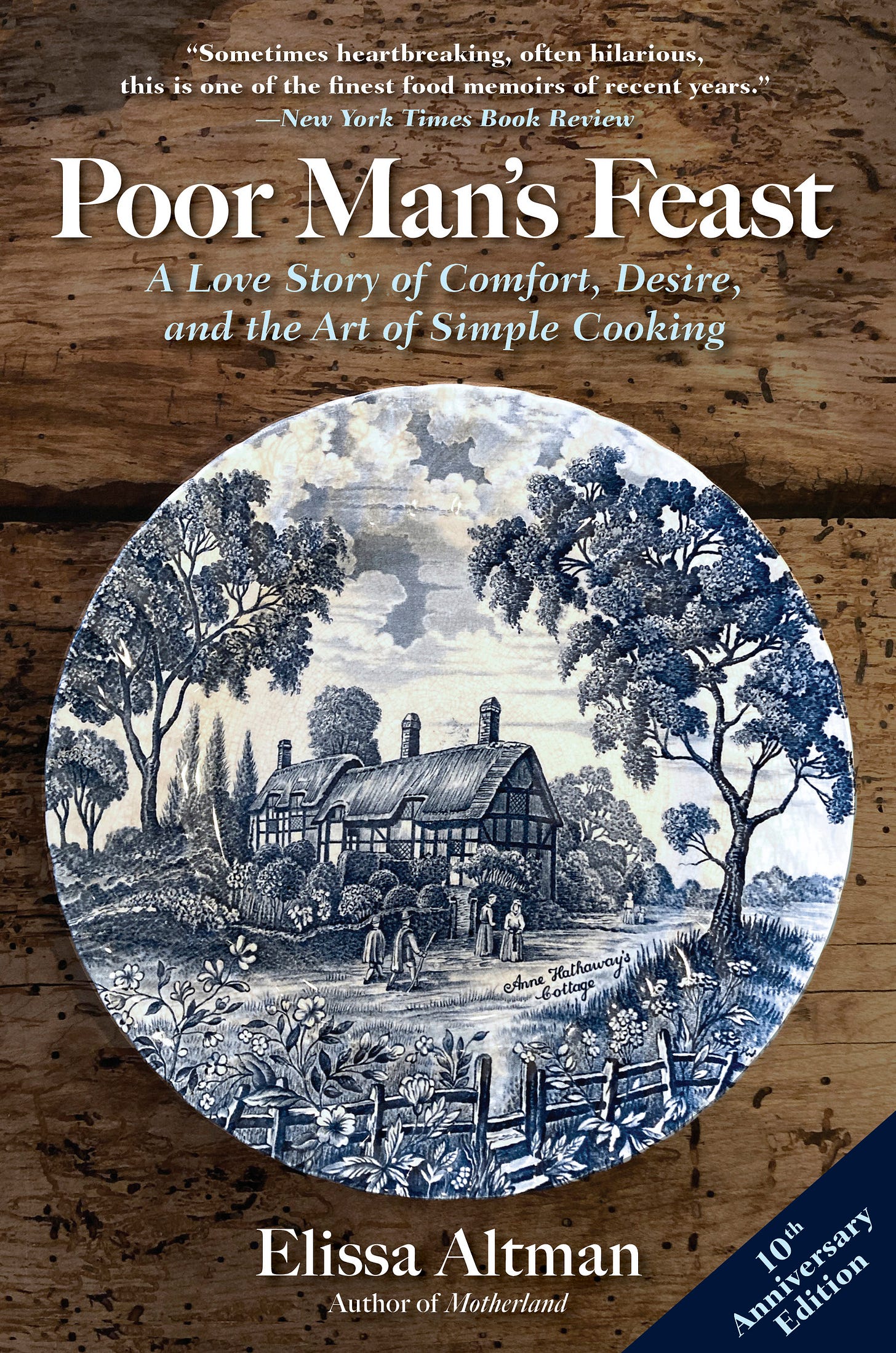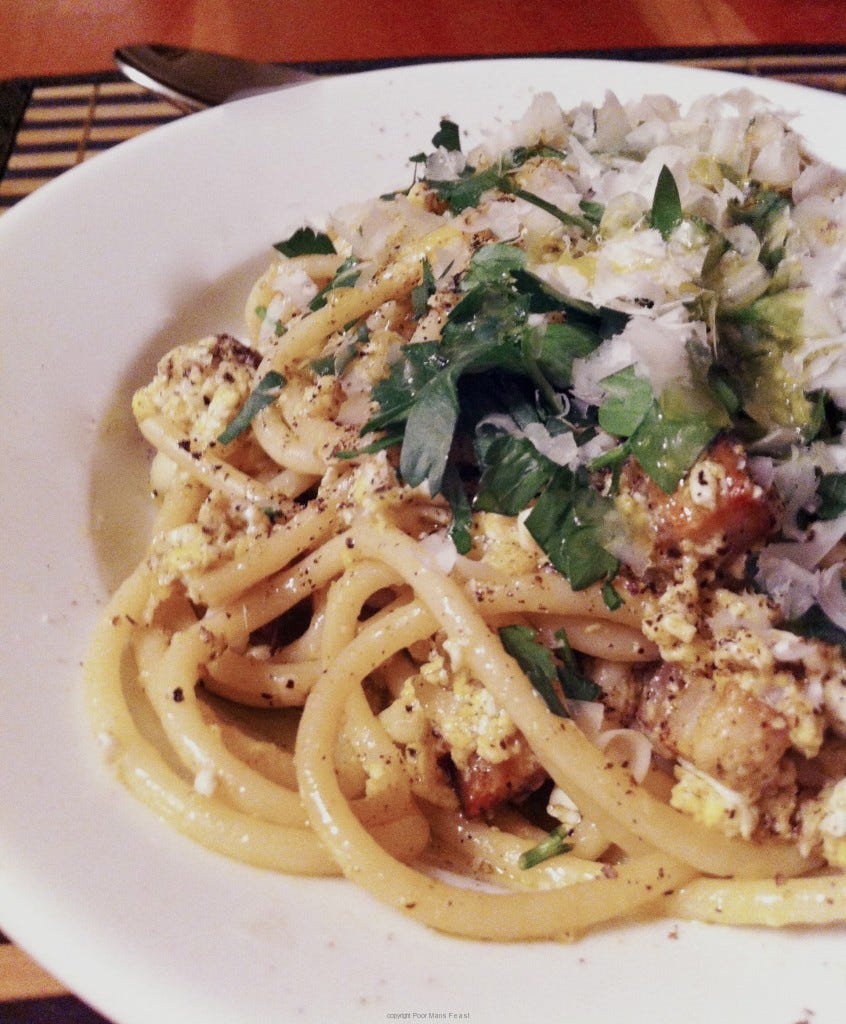midnight dinners
On a Poor Man's Feast When You're Exhausted
We are a few weeks out from the digital re-release of my first book, Poor Man’s Feast, in celebration of its tenth anniversary. (You can preorder it here; if you are preordering it — thank you! — please make sure you order the one with the cover featured above. A new paperback version will be coming soon, date to be announced.) I recently went into the studio to record the audio, which is also coming soon — there was no audiobook the first time around — which meant that I spent three whole days in a little glass booth reading it aloud. Any author who has done this will tell you: after ten years away, it can be a surprising, complicated experience. I am not the same person I was a decade ago; I think of writing and living in a very different way. I think of love in a different way. And I think of my relationship with the kitchen in a way that would have been unrecognizable to myself back in 2013.
In recording the book, I got to re-live my nights as a single girl in Manhattan in the nineties, and how I sustained myself in my tiny east side apartment. It was, in particular, the very late nights that I remember as being the most delicious; they almost always involved carbs, salt, grease, spice, egg, cheese, and a storm of coarse black pepper ground in an ancient, light wood Peugeot mill that I’d bought with my Dean & Deluca discount eight years earlier.
Back then, I lived alone with my cats (big surprise) in a small studio apartment on East 57th Street next door to Le Colonial, one of the best high-end French Vietnamese restaurants in the city. I was making my living as an editor and a writer, and I went out with friends at least four nights a week, not including weekends. My refrigerator, packed with a weird combination of high food (foie gras mousse, black caviar) and low trash (sliced white bread that my mother would leave for me during her unannounced visits while I was at work), always contained some sort of pungent sheep’s milk cheese — usually Roncal or Pecorino Stagionato — and eggs and a chunk of slab bacon (or guanciale, or pancetta). Boxes of bucatini stood in the cabinet, lined up like dominoes. I’d usually come home famished in the very wee hours — at three in the morning —after a night at Au Bar, place a too-small aluminum soup pot of water on my 24-inch apartment stove before I even took my coat off, and set about cooking myself a late supper.
Today, if I eat after ten pm, I dream of wind-up, cymbal-playing monkeys, the IRS, and Heinrich Himmler all showing up at my house at the same time.
It was a long time ago; my stamina was a lot better. Today, if I eat after ten pm, I dream of wind-up, cymbal-playing monkeys, the IRS, and Heinrich Himmler all showing up at my house at the same time. The next day, my ankles leach out over the sides of my shoes. My fingers plump up like cervelats, and my narrow gold wedding ring cuts off the blood flow to my left hand.
Still, the notion of coming home starving after a night of debauchery and craving something elemental is inherently romantic; I’m clearly not the only one who feels this way — much has been written about this deeply personal of non-meal meals. It’s been fetishized the way good bread and a hunk of cheese has — those two things open up the first chapter of Poor Man’s Feast — and it usually involves things like Aglio e Olio, or Cacio e Pepe, or simple fried egg sandwiches. Back when I was single and living in New York, if there was nothing of substance in my refrigerator, I’d sometimes make just that — I’d fry a single egg in a lightly greased cast iron pan, put it between two pieces of the aforementioned disgusting white bread along with a slice of whatever cheese I had laying around (it acts like glue), a little hot sauce, and press it down with another cast iron pan until the bread turned golden and tight, and smooth as skating ice fresh from the Zamboni. When I make it now (which I still do when I’m in need of comfort food), I add spicy kimchi, or broccoli rabe sauteed with a ton of garlic, Calabrian pepper, and olive oil, and I change the proportion of veg to cheese to tip it in the direction of more plants than not; I’m also gluten free now, so my bread has changed too, to buckwheat bread or slow-rise sourdough, which I can tolerate.
For the most part, I don’t eat midnight meals anymore because I’m generally asleep long before that hour rolls around; Susan and I, together now for more than two decades, spend most Saturday evenings cooking together. Nine o’clock finds us listening to the radio on the living room love seat, next to the dog. Ten o’clock, and we’re usually dozing off. By eleven, Pete has been walked one last time, and the lights are out. It’s a sleepy, calm sort of life and I love it, and waited a long time to find it. But when my schedule changes — when I have to travel for work, which I am about to start doing again starting with a month-long writer’s residency in Texas followed by a very busy summer of teaching — and I wind up coming home very late, anything can happen.
Years ago, I was in Santa Barbara speaking at the Edible Institute, an annual meeting involving scores of regional magazine publishers who produce the outstanding Edible Communities publications. After a week away from home, I flew back to the east coast, and at ten o’clock on Saturday night, Susan picked me up at JFK. I had been in the air for hours, wedged into a tiny blue vinyl seat; by the time I touched down, I was exhausted, and so I dozed on and off for the entire car ride home, which took nearly an hour and a half. When we walked through the front door — after the dogs calmed down, after the cats stopped having intimate relations with my luggage — I realized that I was hungry. Not hungry, but crazy hungry. Mad hungry. Famished. Hangry.
Hangry like it was 1996 all over again.
It was also nearly one in the morning.
I’ll make you something, Susan said, her eyes at half-mast. I’d already taken down our six quart soup pot from the rack — stock pots just seem way too big for late night cookery — and filled it. I salted the water heavily, and minutes later, it was at a full, violent boil.
It was one thirty in the morning when we finally sat down at the dining room table, twirling thick coils of salty, smokey pasta around our forks while the dogs slept at our feet.
You sit, I said to Susan, pulling over the little bentwood modern chair where she usually perches while I cook dinner on normal nights.
I can’t believe you’re doing this, she said. Are you really that hungry?
After six hours hurtling through the air in a metal tube, I was standing in the kitchen and browning cubed slab bacon in a big cast iron skillet until clouds of meaty smoke wafted up into the oven hood. The bucatini I unearthed from the bowels of the pantry was too long to fit into the soup pot, so I broke the rules and snapped it in half; while it boiled, I ladled out a cup or so of the pasta cooking water, and beat two eggs with a fork in a small white batter bowl.
I think I might be able to eat, Susan said, hovering over my shoulder while I lifted the pasta into the skillet, poured in the eggs and the bacon, and swirled it over and over to coat every strand; I showered all of it with a strong grating of Parmigiana Reggiano, a handful of freshly cracked black pepper, and a rough chop of fresh parsley.
It was one thirty in the morning when we finally sat down at the dining room table, twirling thick coils of salty, smokey pasta around our forks while the dogs slept at our feet. Very definitely a poor man’s feast, and one that I still love, even though I rarely eat it these days.
The midnight dinners of necessity I ate alone, standing up in my tiny Manhattan kitchen were very good. But that late night meal with Susan, after a long ride home from the airport and a week apart, was far more satisfying.
Recipe
Midnight Bucatini with Bacon and Eggs
Someone once said that it is not only what you eat that makes a meal great, but where and with whom you eat it, and they’re right; circumstance does count for a lot. On the face of it, the combination of pasta, eggs, bacon, and black pepper is a known quantity; ask any Roman what they eat when they want to be comforted and odds are, a version of this dish will be mentioned. But in the right conditions — late at night, when you’re starving and desperately need that combination of salt and smoke, fat and peppery warmth — it is utterly, mouthwateringly glorious.
Serves 2, with leftovers (which you can turn into a frittata the next day)
6 ounces bucatini
1 tablespoon extra virgin olive oil
1/2 cup cubed slab bacon
2 eggs, beaten
1/2 cup freshly grated Pecorino Romano
2 tablespoons freshly ground black pepper
flat leaf parsley, chopped (as much or as little as you like; I use quite a lot)
Bring a large soup pot of salted water to a boil, and cook the bucatini according to the package instructions, stirring it frequently.
While the pasta is cooking, heat the oil in a large cast iron skillet until it just barely ripples, and add the bacon; cook until just golden brown, about six minutes or so, and use a slotted spoon to remove to a small bowl. Wipe out all but a tablespoon of fat from the pan, and keep the pan warm over a low very flame. Ladle out a cup of pasta water from the soup pot, and reserve.
Using heavy tongs, lift the pasta directly from the soup pot to the skillet, and toss with the browned bacon. Slowly pour in the beaten egg, and combine it well, adding a tablespoon or two of reserved pasta water (or more, if necessary). Working quickly, shower with Pecorino and black pepper and toss again and again, judiciously adding more water if the pasta seems too dry (the consistency should be slightly creamy). Sprinkle with parsley, and serve immediately, with more cheese, if desired.






Third paragraph from the bottom lit me up from my head to my toes. Woman!
I want to go home and make this now.....